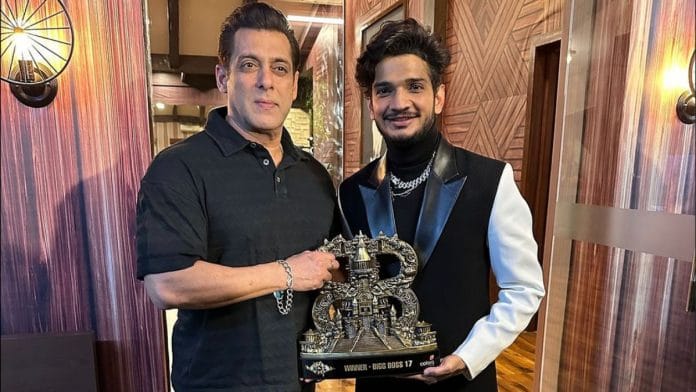Munawar Faruqui has always been ahead of the game. When he was denied a stage as a comedian, he wasted no time turning to reality TV. And now his transformation into a television star is complete: Faruqui was crowned the winner of Bigg Boss season 17, veritably India’s biggest reality show.
He was given a hero’s welcome in his hometown of Dongri, as thousands thronged to celebrate him at a roadshow. The memory of his controversial beginnings in the public eye long forgotten. The roadshow is his ‘Gully Boy’ moment, a love letter to Mumbai’s storied Dongri — once the hub of Muslim culture and intelligentsia in India. And it’s also a love letter to his fans as he reclaims his identity.
Faruqui began 2021 in prison, after which sixteen shows of his comedy special ‘Dongri to Nowhere’ were cancelled. He has been jailed, faced censorial intimidation, the cancellation of his comedy shows, and industry sidelining. But none of it deterred him from the life of stardom he always knew he was destined for. He simply doubled down on what he knows best: being himself.
On 29 January, the day after his win, he generously blew kisses in the air from the sunroof of his car, took selfies, accepted stoles from fans, and saluted the public as a predominantly young male crowd chanted ‘Dongri, Dongri.’ His victory post on Instagram with Salman Khan has over 4 million likes — “The trophy has come to Dongri,” the caption reads, with #munawarkijunta and #munawarkewarrior.
And in Dongri, flex panels declared him ‘Dongri ka sher’ — Faruqui had returned home with a Bigg Boss trophy that thousands of Muslims voted for. And this time, their vote did determine the winner.
“I feel like I’m playing 3-4 different Munawar Faruqui characters all the time,” he told me in December 2021. “One with family, one with friends, one on stage…”
And if his win—and the response to his Dongri roadshow—are anything to go by, Munawar Faruqui has found the formula that works for him.
Also Read: Pani puri, comedy & intolerance — Two days with Munawar Faruqui, the comedian denied a stage
From stand-up to reality TV
Faruqui already has another reality TV win under his belt with the Kangana Ranaut-hosted Lock Upp, a cheeky play on the prison industrial complex — something that wasn’t lost on his fans.
But Lock Upp was a warm-up to this final act. Social media was awash with disappointment at his involvement in a show hosted by Kangana Ranaut, which fans saw as an ideological and identity clash. Many called him a sellout for sharing screen space with her. But he weathered that storm and emerged victorious, having correctly bet on pop cultural relevance.
India’s reality TV audience was, therefore, better prepared for the nonchalant Faruqui in Bigg Boss. His comedy, his poetry, and his wit shone through, keeping the audience hooked to his every move — including a very public breakup that played out parallelly on screens and social media. He told shayris and had flirtations, and the public watched him interact with his ex-girlfriend while another ex-girlfriend announced their breakup on Instagram Live. All this seems to have resonated with people across India.
His comedy, on the other hand, was misunderstood.
He was arrested in Indore in January 2021 after a group of men from a Hindu organisation stormed the stage while he was performing a stand-up act. They claimed he’d made “indecent” remarks about Hindu deities and insulted politicians. After that, his bail was rejected multiple times. He spent 37 days in jail, including his birthday.
In November 2021, he declared that he was “done” with comedy, cancelling his ‘Dongri to Nowhere’ routine. The decision was based on the fact that he didn’t want to endanger either his organiser or his audience.
But he never shied away from his identity as an unapologetic Muslim man, which is what makes his reality TV win so special.
Also Read: Elvish Yadav to Sajid Khan, Indian reality TV has a soft corner for bad boys
Personality wins
On his 29th birthday, Faruqui was in jail for a joke he didn’t tell. Fast forward three years to his 32nd birthday — and the comedian was being crowned winner of Bigg Boss.
Faruqui was simply looking for a space to be himself. Not only did he find that in reality TV, it was reinforced by the millions of votes he received.
And he’s an entertainer first and foremost. Paparazzi are all over Faruqui, who can barely contain his glee while gripping the bronze Bigg Boss trophy in his black-and-white ensemble. He’s always loved an audience and prides himself on being authentic with them.
One thing is for sure: the older, wiser Faruqui has not only found his place in the Indian entertainment industry, he has carved out a piece for himself.
Views are personal.
(Edited by Theres Sudeep)






